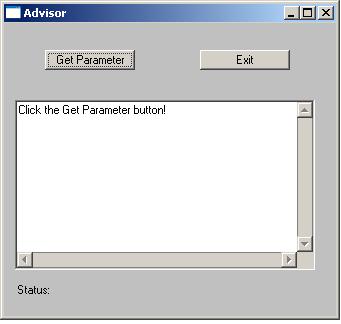14. NEURALNET FILTER PARAMETER ADVISOR
14.1 Parameter Advisor
14.2 License Plate Recognition
14. NeuralNet Filter PARAMETER ADVISOR
NeuralNet Filter has more parameters than the BioFilter and Neural Filter. In this chapter, we will study the Parameter Advisor, which will help you to select values for the parameters. We will use a Car-License-Plate Identification Problem as an example.

Figure 14.1 Parameter Advisor.
The data used in this section is in the �license1\� directory. The Parameter Advisor helps you to choose a set of important parameters for the NeuralNet Filter. The Parameter Advisor will make recommendations for:
- Segment Cut
- Blurring
- Sensitivity
- Internal Weight Cut
- Put all similar images in a directory;
- Set the parameters very high to make sure that the ImageFinder will retrieve the matching images.
Segment Cut = 0
Blurring = 50
Internal Cut = 95
Sensitivity = 95
The reason is: the Advisor will only look at the parameter-range up to a certain point. For example, if you set the Blurring = 20, then the Advisor will only look at the range of Blurring from 0 to 20; if you set the Blurring = 50, then the Advisor will only look at the range of Blurring from 0 to 50;
The data used in this example is given in the following figure:







Figure 14.2 All images in the first class.
The following example will show you how to use the Parameter Advisor. You can duplicate the set up of this example by several clicks:
- Click the �Example/NeuralNet/Parameter Advisor� to open the parameters for this example;
- Click �Batch/Load� to load the parameters;
- Click �NeuralNet/Parameter Advisor� to open the Parameter Advisor;
- In the Parameter Advisor, click �Get Parameter� button; this will initiate the NeuralNet Filter to train and search;
- Close the ImageFinder output. The recommendation will be in the text area of the Parameter Advisor;
- Close the Parameter Advisor.
The first two clicks load the parameters; alternatively, you can do this manually. The data used is in the �.\license1\� directory. The steps to do it manually are:
1. Data directory is �license1\�. See these images with Windows Explorer.
761SBY~7.JPG
761SBY~2.JPG
761SBY~3.JPG
761SBY~4.JPG
761SBY~6.JPG
761SBY~1.JPG
761SBY~1.JPG
2. Set image, license1\761SBY~1.JPG, as a sample image (Click Key
Segment button).
3. Set directory, license1\, as the search directory (Click Search Dir button).
4. Threshold: Average Filter.
Threshold Filter Parameter:
Red: Ignore
Green: Ignore
Blue: 0 � 100; Light Background.
5. Reduction Filter: Real Max
Reduction Filter Parameter
Border Cut = 2
6. NeuralNet Filter Parameter:
Symmetry: Rotation
Segment Size: �S Segmant� (Small)
R(rotation) Type: Type 1
Sample Segment: 50 50 200 200
Set the following parameter to as large as possible to make sure
that the ImageFinder will retrieve the matching images:
Segment Cut = 0You can do all of the above by:
Blurring = 90
Internal Cut = 90
Sensitivity = 90
- Click the �Example/NeuralNet/Parameter Advisor�;
- Click the �Batch/Load�.
- Click the �NeuralNet/Parameter Advisor� to open the Parameter Advisor;
- Open the Parameter Advisor, click the �Get Parameter� button; this will initiate the NeuralNet Filter to train and search;
761SBY~4.JPG 428892
761SBY~2.JPG 59250
761SBY~3.JPG 535000
761SBY~1.JPG 128000000
761SBY~6.JPG 518000
761SBY~7.JPG 14000000
The recommendation is:
Segment Cut: Very HighRemember the recommendation is based on the average of the minimum requirement. The recommendation is generally on the lower side. In this example, we are trying to use one set of the parameters which will fit all of the license plate images, so we will choose the parameter a bit higher than the recommendation.
Blurring: 23 28
Internal Weight Cut: 16 to 21
Sensitivity: 9 to 14
After a few rounds of testing, this is the set of parameters:
Reduction: Real Max14.2 License Plate Recognition
Blurring: 20
Sensitivity: 25
Internal Cut: 22
The data used in this section is in the �.\license� directory. Use the
Windows Explorer to see the images. This example has 50 images from 9 different
car plates. The following are some of the examples:






...
Figure 14.3 The first image in each class.
The operation has two steps:
1. Click �Example/NeuralNet/License Plates� to get the batch code;
2. Click �Batch/Run� Button.
47 out of 50 are identified. There are three errors, 3345~1.jpg, 3349~5.jpg and 3349~9.jpg, which gives
Identification Rate = 94% = 3/50.
Error Rate = 6%.